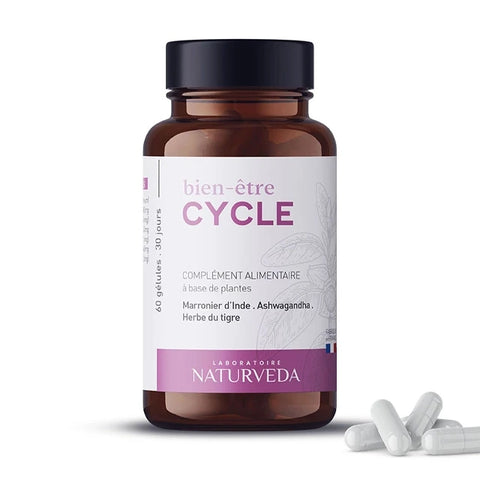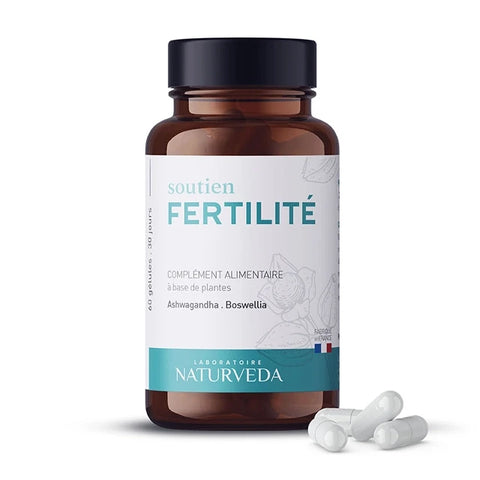6 products
Règles douloureuses: Comprendre et gérer les douleurs menstruelles naturellement
Les règles douloureuses, également appelées dysménorrhée, représentent bien plus qu'un simple malaise pour beaucoup de femmes. C'est en réalité la douleur, parfois intense, ressentie lors du cycle menstruel qui peut varier de légère à sévère. Cette condition est très courante et peut même être suffisamment grave pour perturber les activités quotidiennes. La dysménorrhée, loin d'être un sujet tabou, est une réalité importante qui mérite une présence notable au coeur des discussions sur la santé féminine.
La douleur menstruelle, souvent ressentie comme une douleur sourde ou un resserrement dans le bas de l'abdomen, est un symptôme communément associé aux règles. Son intensité peut varier de légère à sévère, dépendamment de divers facteurs individuels. Non contenue au seul bas ventre, cette douleur peut, parfois, se diffuser aux zones avoisinantes. Ainsi, il n'est pas rare de ressentir un inconfort irradiant vers le bas du dos ou les cuisses. Cette sensation douloureuse, qui peut survenir juste avant l'apparition des menstruations, s'intensifie souvent pendant celles-ci. Sa durée est généralement variable, pouvant s'étendre de quelques heures à plusieurs jours. Il s'agit en somme d'une expérience qui, bien que pénible, est une part inhérente du cycle menstruel de nombreuses femmes.
La dysménorrhée, plus communément appelée douleurs menstruelles, peut être une expérience particulièrement pénible pour certaines femmes. Classée en deux types distincts, elle englobe une réalité complexe. La dysménorrhée primaire, qui se manifeste sans cause sous-jacente identifiable. Elle commence généralement quelques années après l'apparition des premières menstruations, apportant chaque mois son lot d'inconfort. D'autre part, nous avons la dysménorrhée secondaire. Celle-ci est causée par une condition médicale identifiable, comme l'endométriose ou les fibromes utérins. Contrairement à la dysménorrhée primaire, elle commence généralement plus tard dans la vie. Comprendre ces deux types de dysménorrhée est la première étape vers une meilleure gestion des douleurs menstruelles.
Comment gérer le quotidien avec des règles douloureuses ?
Avoir des règles douloureuses peut se révéler être un fardeau quotidien, mais soyons rassurés, il existe des stratégies efficaces pour gérer ce mal-être et maintenir une qualité de vie satisfaisante. La première étape cruciale consiste à adopter une démarche proactive : devenez l'exploratrice de votre propre corps en identifiant ce qui semble déclencher ou aggraver votre douleur. Ces déclencheurs peuvent varier largement d'une femme à l'autre; cela pourrait être certaines activités physiques, des éléments particuliers de votre régime alimentaire, ou même votre niveau de stress.
Une fois que vous comprenez les facteurs qui exacerbent vos douleurs menstruelles, il devient peut-être possible de leur faire face en modifiant légèrement votre mode de vie. Trompez votre douleur au jeu en adoptant des stratégies de vie saines et proactives. Cela pourrait se traduire par une activité physique modérée qui aidera à réguler la circulation sanguine et à soulager les crampes. De plus, pour améliorer la qualité de votre sommeil, vous pouvez instaurer un horaire de sommeil régulier et créer un environnement reposant pour favoriser un sommeil réparateur. Quant à votre alimentation, essayez de la varier et d'y incorporer des aliments riches en vitamines et minéraux essentiels pour renforcer votre corps de l'intérieur. Une alimentation équilibrée s'avère être un pilier fondamental pour favoriser votre bien-être général, y compris lors de votre période menstruelle.
En plus, il est important de donner la priorité à votre repos et de minimiser le stress. C'est tout à fait acceptable, et même essentiel, de ralentir la cadence et de prendre particulièrement soin de vous pendant cette période difficile. Vous pourriez envisager des techniques de relaxation comme la méditation pour vous aider à supprimer les tensions internes. Plongez-vous dans un bon livre pour détourner votre esprit, ou laissez-vous envelopper par la chaleur apaisante d'un bain chaud. Faites ce qui fonctionne pour vous, l'important est de vous détendre et d'accorder à votre corps le repos dont il a besoin.
De plus, divers remèdes naturels peuvent se montrer efficaces pour apaiser ces douleurs menstruelles persistantes. On peut notamment évoquer le thé à la camomille, reconnu pour ses propriétés relaxantes, l'huile de CBD, aux multiples bénéfices anti-inflammatoires, ou encore l'acupuncture, réputée pour sa capacité à rééquilibrer les énergies du corps. N'oublions pas non plus le yoga, dont les différents asanas (postures) peuvent contribuer à détendre certains muscles du bas-ventre, ciblant directement la source du malaise.
Outre ces traitements naturels, il serait bénéfique d'intégrer régulièrement ces pratiques dans votre routine. En effet, instaurer un rythme régulier d'activités relaxantes pourrait non seulement atténuer les douleurs sur le moment, mais également prévenir leur apparition durant les cycles menstruels prochains. Chaque femme étant différente, il est conseillé d'expérimenter différents remèdes pour trouver celui ou ceux qui vous apporteront le plus de soulagement.
Avancer à chaque pas, traverser chaque jour peut parfois sembler insurmontable lorsque vous êtes assise avec cette douleur sourde et lancinante, mais souvenez-vous, vous n'êtes jamais seule dans cette épreuve. Vos amis, votre famille et surtout, les professionnels de la santé sont là pour vous soutenir et vous guider à travers ces moments difficiles. Parler de vos douleurs, partager votre vécu et vos sentiments peut grandement aider à soulager le stress mental qui peut, malheureusement, augmenter votre perception de la douleur. Il est alors crucial de reconnaitre et de prendre en compte votre condition et de chercher l'aide appropriée si nécessaire. Souffrir de règles douloureuses, bien que commun, n'est pas normal et il n'y a absolument aucune honte à ressentir de la douleur ou à chercher de l'aide. Vous êtes forte, vous êtes résiliente et vous êtes capable de surmonter ceci.
Les compléments alimentaires, peuvent-ils réduire les douleurs menstruelles ?
Les compléments alimentaires sont souvent cités comme une alternative naturelle pour soulager les douleurs menstruelles. Ils opèrent grâce à leur richesse en vitamines, minéraux et acides gras essentiels qui ont un impact direct sur le cycle menstruel et la douleur qui y est associée. Par exemple:
Magnésium: Cet élément essentiel a montré des bienfaits significatifs pour les femmes qui souffrent de règles douloureuses. En fait, le magnésium joue un rôle crucial en aidant à la détente des muscles de l'utérus. Cela conduit alors à une réduction des spasmes douloureux qui sont associés à la douleur menstruelle. Ainsi, pour beaucoup de femmes, l'introduction de compléments alimentaires contenant du magnésium peut être une mesure d'allégement efficace. Il est toujours recommandé, cependant, de consulter votre médecin avant de commencer un nouveau complément pour s'assurer qu'il est sans risque et approprié pour votre situation personnelle.
Oméga-3 : Les acides gras oméga-3 ont une place particulière dans le monde des traitements naturels pour les douleurs menstruelles. Réputés pour leurs propriétés anti-inflammatoires, ces derniers peuvent contribuer à apaiser l'inflammation et à diminuer la douleur associée aux règles douloureuses. Les sources riches en oméga-3 incluent les poissons gras comme le saumon et le maquereau, les noix et les graines comme les graines de lin et de chia.
Vitamine B6: Aussi connue sous le nom de pyridoxine, peut être un allié précieux dans la lutte contre les douleurs menstruelles. Riche en propriétés anti-inflammatoires, elle aide à favoriser un meilleur équilibre hormonal, ce qui peut contribuer à réduire l'intensité des douleurs. On la trouve principalement dans les aliments comme le poisson, la volaille, les légumineuses, et diverses céréales entières. Considérez de l'inclure dans votre alimentation pour voir si elle peut vous aider à soulager vos douleurs menstruelles.
Il est important de noter que tous les compléments ne sont pas créés de la même manière, il est donc essentiel de choisir des produits de haute qualité et idéalement sous la supervision d'un praticien de santé. Toujours discuter avec votre médecin avant de commencer à prendre un complément alimentaire pour les douleurs menstruelles, surtout si vous prenez d'autres médicaments.
La gamme de NaturVeda, une selection de produits naturels spécialement conçus pour vous accompagner pendant votre cycle menstruel et soulager les douleurs associées aux menstruations. Grâce à leurs ingrédients de qualité, sélectionnés pour leurs propriétés bénéfiques, les produits NaturVeda sont de véritables alliés pour vivre plus sereinement cette période du mois.
- Bien-être Cycle menstruel: Le complément alimentaire BIEN-ÊTRE CYCLE a été conçu pour améliorer le confort feminin et réguler leur cycle menstruel. Composé de plantes ayurvédiques riches en principes actifs, BIEN-ÊTRE CYCLE offre une soutien optimal pour atténuer les maux liés au cycle menstruel.
- REINE DES PRÉS Biologique Premium: La reine des près est souvent utilisée pour soulager les douleurs et les inflammations, notamment les douleurs articulaires, les maux de tête et les douleurs menstruelles, grâce à ses propriétés anti-inflammatoires et antalgiques. Elle contribue aussi à réduire les crampes menstruelles. Certaines études suggèrent également des effets sur l'amélioration du sommeil, ce qui en fait l'alliée idéale pour le traitement de la ménopause.
Règle douloureuse ou autre maux du cycle feminin ?
Entendons-nous, les règles douloureuses peuvent parfois être confondues avec d'autres problèmes gynécologiques. Il est, ainsi, essentiel d'apprendre à distinguer les symptômes.
En termes de douleurs menstruelles, elles sont généralement récurrentes, survenant généralement quelques jours avant et pendant le cycle menstruel. Elles peuvent être accompagnées de nausées, de maux de tête et de diarrhée. L'endométriose, en revanche, produit une douleur plus persistante qui peut être ressentie bien après le cycle menstruel et peut être accompagnée de douleurs pendant les rapports sexuels ou de troubles intestinaux.
En ce qui concerne les problèmes de fertilité, ils ne présentent souvent aucun symptôme si ce n'est l'incapacité à concevoir après plusieurs mois de tentatives. Des règles irrégulières ou absentes ou des douleurs pelviennes peuvent indiquer un tel problème. Si vous rencontrez ces symptômes en conjonction avec des cycles menstruels douloureux, il serait judicieux de consulter votre médecin.
Le syndrome prémenstruel (SPM), de son côté, implique un ensemble de symptômes qui débutent une à deux semaines avant les règles. Ceux-ci peuvent inclure des sautes d'humeur, de l'épuisement, de l'irritabilité, le gonflement des seins, des envies d'aliments spécifiques, des maux de tête et, naturellement, des douleurs abdominales.
Parlons maintenant de la préménopause, qui est une autre période pouvant occasionner des douleurs menstruelles. La préménopause, c'est la phase qui précède la ménopause et au cours de laquelle les niveaux d'hormones féminines (œstrogène et progestérone) commencent à fluctuer. Ces fluctuations peuvent entraîner une série de symptômes, y compris des douleurs menstruelles plus intenses ou variables. Il est important d'évaluer votre douleur en collaboration avec votre médecin, car celle-ci peut être un indicateur de la préménopause. Ainsi, vous pouvez mieux naviguer dans cette nouvelle phase de votre vie reproductive avec toutes les informations nécessaires. Des options de traitement naturelles peuvent être envisagées pour soulager ces douleurs, tout comme pour les règles douloureuses générales.
La ménopause, quant à elle, marque la fin des cycles menstruels. Alors que les règles douloureuses peuvent se poursuivre jusqu'à la ménopause, cette dernière est caractérisée par des symptômes supplémentaires tels que les bouffées de chaleur, la nuit de sueurs, l'insomnie, la prise de poids, la sécheresse vaginale et les changements d'humeur.
En conclusion, il est important de consulter un professionnel de la santé si vous rencontrez des symptômes anormaux ou persistants. Il est crucial de comprendre que chaque femme est unique et peut éprouver ces conditions de manière différente. En outre, une prise en charge efficace implique non seulement des traitements, mais aussi une compréhension et une écoute de ce que votre corps vous dit.










